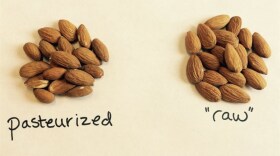By now most people know that almonds use a lot of water, about one gallon per nut. Most growers are relying on groundwater even more this year because their surface water has been cut off because of the drought. But as Valley Public Radio’s Ezra David Romero reports that brings a different problem all together, one that an “Almond Doctor” is trying to solve.
Brothers Paul and David Parreira ship over 30 million pounds of almonds around the globe each year from Rpac Almonds south of Los Banos on the Westside of the Valley. They process so many almonds that their crew is still processing the last of the 2014 crop.
"This tree is screwed. You can actually see out on the end of this branch where the tree has tried to re-leaf. You see these small tender leaves where it defoliated completely and now has tried to leaf out again."
"Basically what it’s sorting out are the ones that are split," says Paul Parreira. "They would either go maybe into an almond butter or an almond milk product."
This year because of the drought the Parreira’s have a problem, which may come as a surprise to some. I’m talking about salt. Not the salt added to make roasted almonds savory, but salt in groundwater killing trees.
“The trees just don’t look healthy," Parreira says. "Everybody is watering at the minimum levels with high salinity water. It’s a double edged sword.”
High salinity levels in groundwater used for agriculture on the Westside of Central California is commonplace, but this year the issue is compounded. Many farmers have a zero allocation of surface water from the Delta. These farmers are forced to irrigate with salty groundwater and the little water they receive from the Sacramento Delta is also high in things like salt.

“Without any adequate rainfall to move those salts down through the soil there’s just no way for us to remove those salts," Parreira says. "Not only is it staying there, we’re adding to it because of the poor quality from the Delta.”
The brothers and I visit a nearby orchard solely irrigated by salty groundwater. The view is pretty dismal.
"From a distance you can see at that these trees are just lacking the color that we would normally would expect. It's a little bit of a lime greenish. It's not that dark green. As we look down the row we can even see a little bit of a bronze tinge kind-of on the outside canopy of the trees."
“This tree is screwed," Parriera says. "You can actually see out on the end of this branch where the tree has tried to re-leaf. You see these small tender leaves where it defoliated completely and now has tried to leaf out again."
The problem of salinity isn’t just an issue for almond growers on the Westside of the Valley. That’s why the Almond Board of California has a focused effort on salinity.
“Water quality and quantity are very big issues for us," says Bob Curtis Bob Curtis the board’s director of agricultural affairs. "To that end we are funding research on updating the impacts of salinity on almond tree growth and prodcutivity."
That research will help farm advisors across the region educate growers on the issue. Curtis also says crop yields for almonds statewide are projected to go down by four percent this year, mostly because of effects of drought: fallowed land, smaller almonds and salt.
One of those farm advisors is David Doll.
“We’ve been seeing this increasing problem over the past couple years due to the lack of winter rain of sodium burn or salt burn on leaves," says Doll.

He’s a farm advisor with the UC Cooperative Extension based in Merced. But he’s better known as the “Almond Doctor.”
“We’re pulling up to the orchard," says Doll. "This is just three miles south of Livingston.”
Seven years ago Doll realized there were very few resources for almond farmers on how to grow safely and efficiently. So he started a blog called “The Almond Doctor.” Today there are nine “almond doctors” across the state and his blog is considered a hidden gem to the industry.
"Hopefully whatever rain we do get will help aid with the flushing of the root system of the tree."

Doll is diagnosing an orchard in Merced County where the effects of salty groundwater are evident.
“From a distance you can see at that these trees are just lacking the color that we would normally would expect," Doll says. "It’s a little bit of a lime greenish. It’s not that dark green. As we look down the row we can even see a little bit of a bronze tinge kind-of on the outside canopy of the trees.”
In Merced the issue isn’t just salty groundwater. The kicker is preexisting salt laden soil. Almond trees have a threshold for how much salt they can take in. The trees fight toxicity as long as they can, but at some point they give up and salt wins. Doll says the answer to save the trees is to dilute the potency of salt in groundwater.
“Rain will do it naturally for us, but if we don’t get rain we’ve been encouraging farmers to actually fill the profile with irrigation water, whatever they can by December," Doll says. "And then hopefully whatever rain we do get will help aid with the flushing of the root system of the tree.”
But if rain doesn’t come, Doll says to expect a shrinking California almond crop in the years to come.




